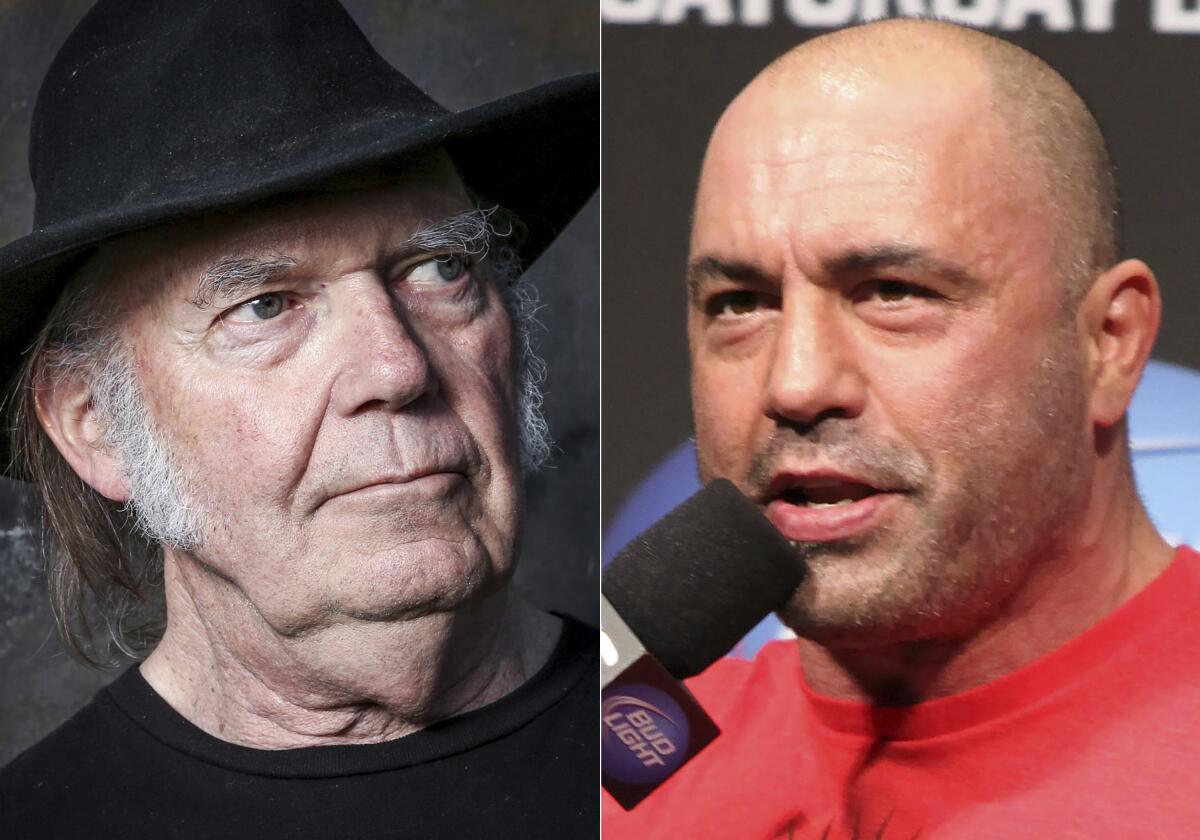Feedback: Joe Rogan, Spotify and misinformation vs. disinformation

- Share via
Mayhem of the misinformed
Regarding “Podcast Host Rogan Speaks Loudly” by Matt Pearce and Wendy Lee [Jan. 27]: This article is not the first I’ve read in The Times that defers to public figures lying about the benefits and efficacy of COVID-19 vaccines and hyping fake and dangerous alternatives.
The Times seems to default to the term “misinformation,” which happens when the disseminator actually believes what they tell others. Innocent enough, they’re misinformed themselves, right? Maybe Joe Rogan ate one too many bugs on his show that was greenlighted during a Hollywood writers strike. If he really believes the falsehoods he peddles, then OK. Maybe he should see a doctor for that.
The term I prefer for most stories about people like Rogan in entertainment, politics and in between is “disinformation,” which means the teller of these tall tales knows that what they are telling listeners is false and is meant to harm or put them at a disadvantage. There’s no worse disadvantage than being dead.
John Kluge
North Hollywood
::
I applaud Neil Young’s move to depart from Spotify, calling attention to the farce that is Joe Rogan and the misinformation he spews. I hope many other artists will follow suit.
Where are our musical bards at this critical time in history when the world is under assault by right-wing lunatics, dictators and a U.S. conservative party under the thumb of a very dangerous demagogue?
Bob Dylan, Paul Simon, Bruce Springsteen, Joni Mitchell, hip-hoppers and rappers — a nation and a world turns its lonely eyes to you, to speak out against and about the madness of our times. We need these voices now more than ever.
Jon Leonoudakis
Sherwood Forest
Best kind of ‘Drive’ time
Thank you, L.A. Times, for sharing the gift of Justin Chang’s writing. I enjoyed his unabashed love letter to Ryusuke Hamaguchi [“Hey, Academy, Drive This ‘Car’,” Jan. 30], and then his cheeky comments in “The Critic’s Choice for Oscars,” Jan. 30, where there was yet another call-out to Hamaguchi in original screenplay for “Wheel of Fortune and Fantasy,” which almost got a second director’s recommendation for him.
I laughed out loud at this line in the international feature section: “It’s my party and I’ll pick movies that weren’t submitted or shortlisted if I want to.”
As always, thank you for Chang’s insight and humor.
Jane Manson
Lakewood
The banned book effect
Brilliant reverse psychology [“Banned in Tennessee, ‘Maus’ Sales Spike” by Nardine Saad, Feb. 1]. Ban books and watch their sales skyrocket. Covering up history, or in this case a mouse, had unintended consequences.
Fortunately, school boards can’t ban public libraries, bookstores or Amazon.
Donna Sloan
Los Angeles
A man of wealth and fame
Regarding “Hefner Exposé Bares a Lot, But ...” by TV critic Lorraine Ali [Jan. 31]: So Sondra Theodore’s solution to preventing Hugh Hefner from having sex with her dog was to make sure they were never alone together again? How about, say, giving the dog to someone unwilling to support Hefner’s degradation and corruption of literally everything he touched?
Those who enabled Hefner’s behavior with their participation and silence go a long way toward explaining Donald Trump.
Jacqelen Ruben
Woodland Hills
Scan this? No thanks
Carolina A. Miranda was spot-on [“The Curse of QR Codes in Museums,” Jan. 30]. Unfortunately it’s not only museums that have embraced QR/barcode scanning. My wife is constantly complaining how even grocery shopping has become age-discriminatory. If you want to get coupons or extra savings on your purchases, you’re required to use your phone to scan items on a store’s app first. It’s ageist and wrong. My wife and I are millennials and both feel this way.
Michael Sohcot
Granada Hills
Not quite ‘Downton Abbey’
While watching HBO’s “The Gilded Age” I had some of the same questions Robert Lloyd posed [“‘Gilded’ Offers Only Bits of Gold,” Jan. 26]. I think that the reason this series doesn’t resonate like “Downton Abbey” is because in America we don’t believe in an aristocracy.
In England, centuries of class structure formed the background of “Downton Abbey” (and we see it start to crumble in the 20th century). “The Gilded Age” shows us people who have placed themselves in a lorded position and then fancy themselves better than others who are also trying to put themselves in that position. It appears much more mean-spirited.
When Maggie Smith (as Violet Crawley in “Downton Abbey”) gives a biting remark, you can almost excuse it as naivete — she really doesn’t know better. But when Christine Baranski as Aunt Agnes puts her nose up in the air, we know she breathes the same air we do.
Still, just like “Downton Abbey,” “The Gilded Age” is a guilty pleasure.
Kathy Allavie
Riverside
‘The Method’ to the madness
Regarding Sheana Ochoa’s review of the book “The Method: How the Twentieth Century Learned to Act” by Isaac Butler [“A biography of an Acting Revolution,” Jan. 27]: The “unresolvable dispute” has been resolved over and over again by most working actors who, no matter who they have studied with, are keenly aware that the basis of all modern training was started by Stanislavski. It was carried forth by many talented individuals, adapting it to their own talents and cultures, just as Freud is certainly acknowledged as the progenitor of psychology, no matter what school sprung from it as it developed.
I don’t know many actors who don’t combine imagination with their personal experience in creating a role. The basic rule for all very good actors has always been to go wherever they have to for the authenticity needed for the part. The great ones know there are no real rules.
An important book that has yet to be written on the subject would be one where there is a serious discussion as to why, in this country, we have yet to establish a fine national theater that would support the thrilling art of acting that Butler cherishes.
Barry Primus
Los Angeles
The pandemic isn’t over yet
Amy Dickinson’s response to letter-writer “Over It and Hopeless” should be published as a front-page story [“Ask Amy: This Pandemic Will Pass”].
As a psychotherapist I can personally attest to the fear and grief people from the world over are suffering during this seemingly never-ending pandemic.
Dickinson succinctly sums up what the current science tells us based on the history of pandemics and diseases, and offers up some nice coping tools for how to restore hope and regain resilience. Restoring hope is vital during these dismal days.
Megan Layton Martinez
Whittier
More to Read
The biggest entertainment stories
Get our big stories about Hollywood, film, television, music, arts, culture and more right in your inbox as soon as they publish.
You may occasionally receive promotional content from the Los Angeles Times.











